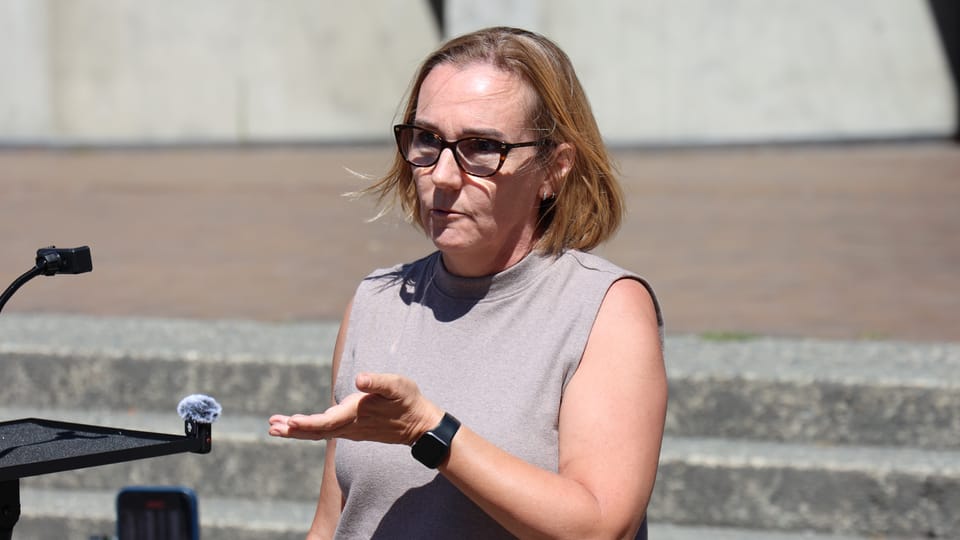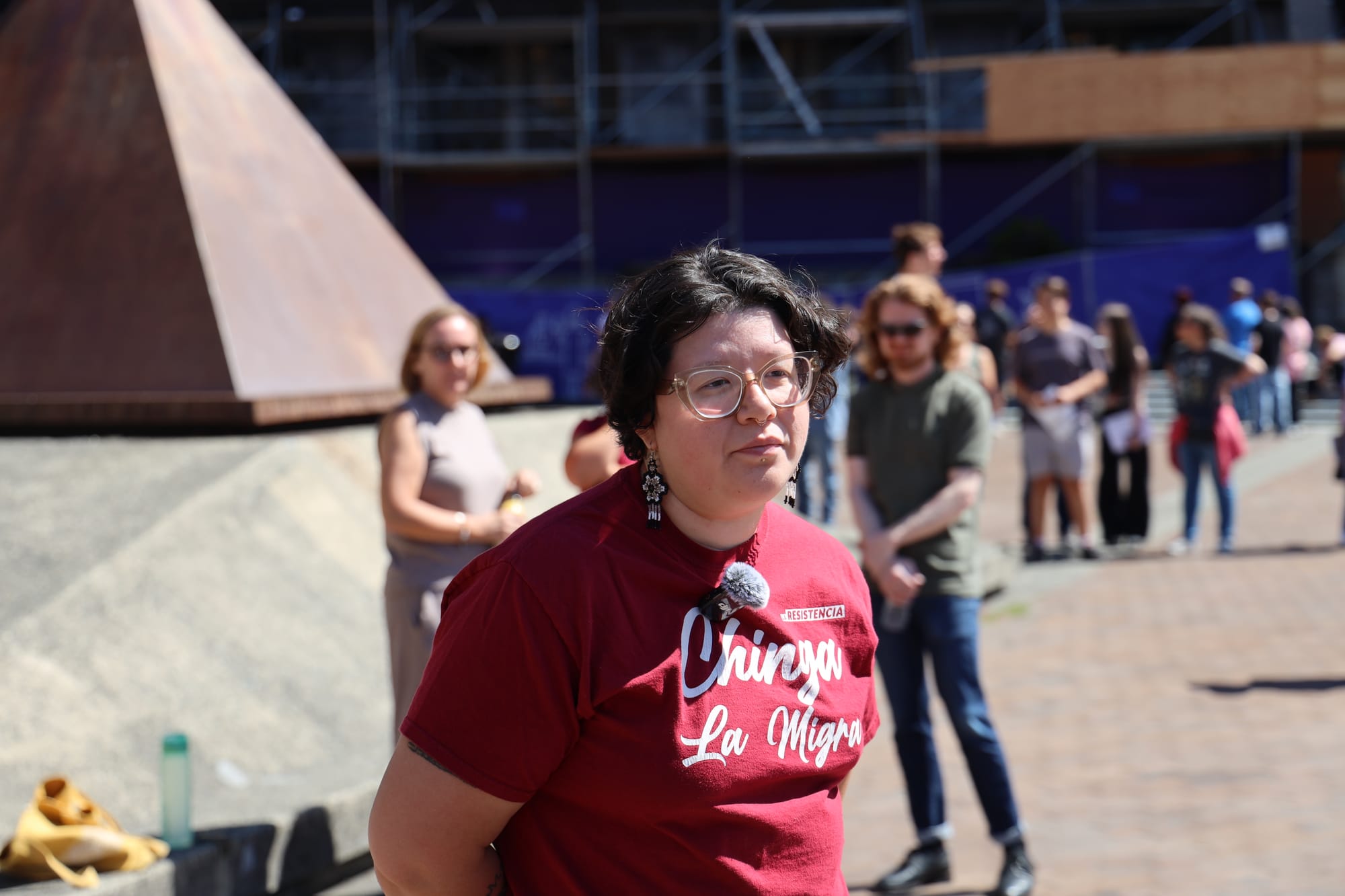ICE and CBP are disappearing Washingtonians. What does that mean?

A human rights watchdog alleges the federal agencies have grossly violated international law
A new report from the University of Washington Center for Human Rights (UWCHR) has reached a startling conclusion: Immigration and Customs Enforcement (ICE) and Customs and Border Protection (CBP) have forcibly disappeared people in Washington state in at least 16 instances, including 14 individuals and two families, since U.S. President Donald Trump took office in January.
The center says the two federal agencies in charge of immigration enforcement have crossed a threshold into grave violations of human rights and humanitarian law, engaging in at least two types of international crimes: enforced disappearances and refoulement.
What is an enforced disappearance?
At an Aug. 21 press conference announcing the report, UWCHR director Angelina Godoy explained that an enforced disappearance consists of several aspects that go beyond a simple detention or arrest.
“To meet the criteria of forced disappearance requires three conditions,” Dr. Godoy said. “One, a person taken into custody, typically of the state under some circumstance; maybe a party acting in state-like capacity, but typically of the state, which is what we have here. Two, the state denies access to information about where they are, how they are doing. Families oftentimes don’t know if their loved one is alive or dead, let alone where they may be held at any given time. And third, as a result of that, people are placed outside the protection of the law. They’re held incommunicado in most cases, unable to obtain legal representation, unable to defend their rights legally. That means, of course, that they may then continue to experience other types of grave violations like torture and many other things.”
Godoy argued that in the 16 cases the center had identified, detainees had been denied basic rights and due process such as the right to legal representation and to appeal deportations or transfers.
The UWCHR report also outlined a large but unknown number of deportation cases from Washington state in which the act of “refoulement” was committed, a legal term used to describe when a refugee or asylum seeker is sent back to the country where they faced political persecution. Refoulement is strictly prohibited by the 1951 U.N. Refugee Convention and 1967 Protocol, the latter of which the U.S. is party to. Much of the convention’s text has been adopted into U.S. law under the 1980 Refugee Act.
While the concept of “non-refoulement” is established in U.S. law, enforced disappearance has not been recognized by U.S. courts. However, several provisions, such as the Fifth and Fourteenth Amendments of the U.S. Constitution, mandate due process to all people detained by the state, regardless of their immigration status. The U.S. has not signed or ratified the 2006 U.N. Convention that prohibits enforced disappearances, which has been adopted by 76 countries. However, the U.S. is a party to the U.N. Convention against torture, upon which the enforced disappearance convention is based.
The allegations of grave human rights and humanitarian law violations by the U.S. are noteworthy as wealthy, historically colonizing nations of Europe, North America and the Anglosphere played an influential role in the development of international law. This fact, as well as the lack of retroactive application to historical atrocities like the European invasion of the Americas and trans-Atlantic slave trade, has led some scholars from the Global South to accuse international legal institutions of bias. The UWCHR report could be seen as an attempt to finally apply human rights law to the Global North as well.
@guy.oron The UW Center for Human Rights just released a report documenting 16 cases of enforced disappearances by ICE in Washington State since Trump took office. These include deportations to CECOT in El Salvador, third countries like South Sudan, transfers to Guantánamo Bay and even families being held for weeks with no access to legal counsel. #news #washington #journalism #ice #cbp ♬ original sound - guy.oron
Families detained for weeks without access to the outside world
Among the 16 cases of enforced disappearance studied by UWCHR researchers, seven involved migrants who were expelled to El Salvador’s CECOT megaprison in violation of a federal court order and six were related to migrants who were transferred to a detention facility Guantánamo Bay without any access to counsel or information provided to family members. Another of those cases was that of Tuan Thanh Phan, a Vietnamese American who was deported to South Sudan and later transferred to detention at a U.S. military base in Djibouti.
Phan’s case made national news headlines due to the fact he was deported to a likely unsafe third country, thousands of miles away from his home country of Vietnam. In an unsigned June 23 order, the U.S. Supreme Court allowed the Trump administration to continue sending immigrants to “third countries.”
Among the most harrowing cases covered in the UWCHR report involve two families who were detained by CBP and held in confinement for weeks without access to legal counsel. A family of six asylum seekers from Africa and were apprehended on April 26, were held in a single windowless cell with no bedding or bathing facilities for 24 days in Blaine, WA near the U.S.-Canada border. Their youngest kid was only 11 months old and a U.S. citizen, while the mother was in the second trimester of pregnancy during her detention.

A trend of migrant dehumanization
Immigration advocates who spoke at the press conference shared that the new phase of enforced disappearances by ICE and CBP is only the next step in a long process of dehumanization against migrants in the U.S. Josefina Mora-Cheung, an organizer with the immigration justice group La Resistencia, said that immigrants in Washington state are currently experiencing greater hostility by the Trump administration.
“There’s already a fear amongst the heightened climate against immigrants already,” Mora-Cheung said. “And for family members to not know that their family members are being detained or deported just puts an immense amount of trauma on our immigrant communities. We know from historical attacks on many different immigrant communities that this leaves not only direct trauma, but intergenerational trauma as well.”
Although Godoy expected human rights conditions of migrants to worsen under the Trump administration, she expressed astonishment over the rapid pace of progression toward graver abuses.
“I never expected, not in my wildest dreams, that through that rigorous process of cross-checking and cross-corroborating, we would come up with 16 cases, or actually it’s 14 individuals and then two families, in just a few months who have experienced forced disappearance in ways connected to the state of Washington,” Godoy said. “That’s an atrocious number. It’s shocking. It defies understanding.”
She added though that even before Trump took office, immigrants had already faced an unacceptable level of deprivations and abuses within the immigration system that had become routine.
“The way we got here, to this place where people are being forcibly disappeared, is by collectively tolerating the daily violation of migrants rights in the detention process, in the deportation process — it’s happening every day,” Godoy said. “However, forced disappearances are yet another level of concern”
Dr. Angélica Cházaro, an immigrant rights advocate and professor at the UW School of Law, said the Northwest ICE Processing Center in Tacoma, commonly referred to as the Northwest Detention Center (NWDC), is notorious for its poor treatment of migrants. These conditions have led to numerous hunger strikes and protests from detainees.
“It’s both like the devil we know, the Northwest Detention Center and the terrible conditions there that hunger strikers for years have been calling attention to, and new practices of detention and disappearance that the report is pointing to.”
Critics of ICE have also pointed to the increasing politicization of ICE, with some alleging that the Trump administration is targeting political dissidents such as Palestinian U.S. permanent resident Mahmoud Khalil. Here in Washington, immigrant rights advocates have accused authorities of targeting Alfredo “Lelo” Juarez Zeferino, a farmworker union organizer, for his work opposing the H2A program. Juarez Zeferino returned to Mexico in July after what he described as nearly four months of poor treatment at the NWDC.
More recently, ICE’s Aug. 21 detention of Muhammad Zahid Chaudhry, a U.S. veteran and anti-war activist, also raised concerns of political targeting. Chaudhry’s wife, Melissa Chaudhry, ran for congress in 2024 on a left-leaning, pro-Palestine and anti-war platform.
Potential for action by state and local authorities
At the UWCHR press conference, advocates claimed that Washington state and local government officials could take a more assertive approach to stymying ICE and CBP’s attacks on migrants. The center’s report revealed for the first time that ICE is now deporting immigrants on commercial flights from the Seattle-Tacoma International Airport, in addition to King County’s Boeing Field. Cházaro said the Port of Seattle, for example, could take further actions to increase transparency on ICE operations at SeaTac.
“The moment it was clear [Trump] was taking office, that was a moment for every single institution in Washington state to be taking a look at its practices to see how could we or are we complicit in ICE’s practices? And that has not happened,” Cházaro said. “We see that with the Department of Licensing, with them releasing so much information to ICE actively. We see that now with the Port of Seattle, apparently not being aware that our airport in SeaTac is being used for these deportations. Those are the sorts of things that they should have proactively been looking for at the moment that they saw the [arrival of the new] Trump administration, not holding press conferences when they claim to be supportive of immigrants without actually doing the hard work that this group of researchers at UW has done on their own to figure out what those are.
“It shouldn’t take the UW Center for Human Rights spending months of their time to reveal these connections. That is the responsibility of the institutions themselves. And so that to me is part of what's shocking.”
Cházaro also said that Washington leaders, including Washington Gov. Bob Ferguson, have ignored the plight of the small subset of migrants who have been convicted of criminal offenses. She said that people who serve their sentences shouldn’t be punished a second time via deportation. Washington’s Keep Washington Working Act, the sanctuary law that forbids cooperation between state and local authorities with immigration enforcement, has an explicit carve-out that lets the state Department of Corrections transfer immigrants directly to ICE custody after they finish their sentences.
According to Cházaro, Ferguson could have pardoned Phan after he completed his 25-year sentence for first-degree murder and second-degree assault, but before he was deported to South Sudan, which would have prevented immigrant judges from revoking his green card and thus allowed him to stay in the U.S.
“The case we were making was that Governor Ferguson was the one person whose decision could lead to Tuan returning to the US on his green card,” Cházaro said. “And so the fact that he failed to take that action, to me, puts the responsibility on him.”

Member discussion